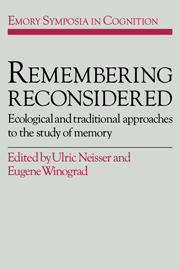
-
Select format
-
- Publisher:
- Cambridge University Press
- Publication date:
- 25 March 2010
- 24 June 1988
- ISBN:
- 9780511664014
- 9780521330312
- 9780521485005
- Dimensions:
- (228 x 152 mm)
- Weight & Pages:
- 0.74kg, 404 Pages
- Dimensions:
- (228 x 152 mm)
- Weight & Pages:
- 0.551kg, 404 Pages
- Subjects:
- Animal Behaviour, Social Psychology, Psychology, Cognition
- Series:
- Emory Symposia in Cognition (2)
You may already have access via personal or institutional login- Subjects:
- Animal Behaviour, Social Psychology, Psychology, Cognition
- Series:
- Emory Symposia in Cognition (2)
Book description
In Remembering Reconsidered, the new ecologically oriented study of memory makes contact with more traditional approaches. The emerging result may be what several of the authors have begun to call 'functionalism': a concern with the adaptive significance of memory in ordinary life coupled with a careful analysis of the variables on which it depends. In different ways, the chapters reflect this concern. The editors bring together a diverse collection of studies on remembering, using subjects ranging from folk songs to 'crib talk'. Introductory chapters weave these themes together, developing an underlying sense of the project of the volume as a whole. This is the second volume in the Emory Symposia on Cognition. The Emory Cognition Project, directed by Ulric Neisser, emphasizes an ecological approach to problems in theoretical, experimental, and applied cognitive psychology.
Reviews
'As is demonstrated by Remembering Reconsidered, the ecological approach has clearly served the admirable purposes of expanding the scope of memory research and providing the psychological study of memory with a base in naturalistic observation that it lacked previously.'
Source: Science
'Remembering Reconsidered, shows how the ecological approach is significantly reshaping our ideas about the psychology of memory.'
Source: Contemporary Psychology
'The contributions to Remembering Reconsidered are of uniformly high quality and contain a wealth of new facts about manifestations of memory in various real-world contexts.'
Source: Science
Contents
Metrics
Altmetric attention score
Full text views
Full text views help Loading metrics...
Loading metrics...
* Views captured on Cambridge Core between #date#. This data will be updated every 24 hours.
Usage data cannot currently be displayed.
Accessibility standard: Unknown
Why this information is here
This section outlines the accessibility features of this content - including support for screen readers, full keyboard navigation and high-contrast display options. This may not be relevant for you.
Accessibility Information
Accessibility compliance for the PDF of this book is currently unknown and may be updated in the future.


